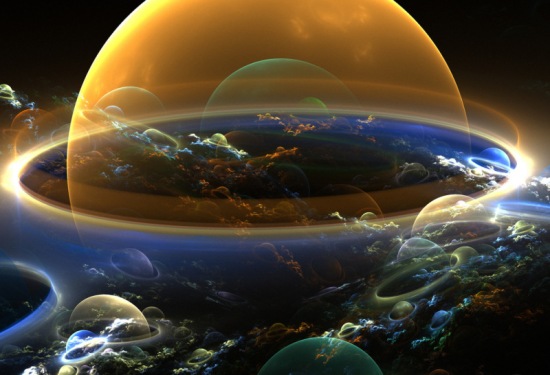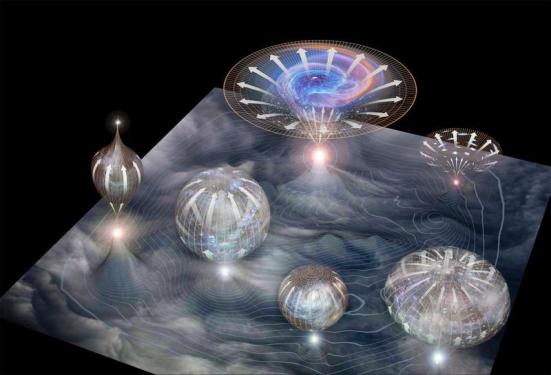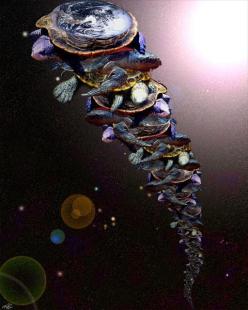Thomas Jay Oord: creatio ex creatione a natura amoris

“Curiouser and curiouser!” cried Alice after falling down the rabbit hole. Like most of his fellow contributors to Theologies of Creation, Thomas Jay Oord believes that “we need an alternative to creatio ex nihilo” (p. 120). The model that he proposes is perhaps the most curious of them all: God always creates out of creation in love.
In his essay Oord briefly advances several criticisms of creatio ex nihilo, but theodicy appears to be his principal concern. If God is as powerful as the doctrine supposes, then he is ultimately responsible for the evils of the world:
Perhaps the chief problem with creatio ex nihilo and the omnipotence it requires is its implications for the problem of evil. To put it bluntly: The God capable of totally controlling others is culpable for failing to prevent all genuine evil. A God with this kind of power is morally responsible for permitting evil if not also causing it. The omnipotence required for creating from nothing, therefore, creates problems for believing God expresses steadfast love. … The problem of evil remains unsolvable to those who affirm creatio ex nihilo. (p. 112)
If God is able to create from nothing, then surely he would use such incredible power to prevent both natural evil and human evil. A maniac enters a restaurant and begins shooting the helpless diners. An omnipotent God could instantaneously create bullet-deflecting walls to shield the diners, and an omnibenevolent God would most certainly do so. So if the Creator is both omnipotent and omnibenevolent, why does he not protect us from such evils? Why does he allow horrors beyond imagining? Why does he not act to prevent our suffering? Perhaps, we might answer, because God intends to bring about a greater good. Oord finds this answer unpersuasive: “It is impossible for me—and I think most people—to believe a loving God capable of creating obstacles out of nothing nevertheless always fails to do so because it somehow makes the world a better place” (p. 112).
Curiously, Oord does not mention what many believe to be the two strongest rejoinders to his objection: (1) Actions have consequences; causes effect. If God were always intervening within the natural order to prevent evil, there would be no natural order. Can we really imagine a material world where asteroids do not collide with planets, tectonic plates do not shift, tigers do not eat lambs, and bullets do not pierce flesh? Perhaps we think we can, but can we really? (2) God does not intervene to protect people from the evil deeds committed by others because he respects the freely chosen actions of his creatures. If he did not exercise such restraint, human freedom and moral responsibility would be meaningless. No one would sin, not because they freely embrace good but because they know that their immoral actions will bring them no perceived benefit.
Let’s assume that Oord has compelling responses to both defenses. It’s obvious that the Deity he needs for his theodicy is one of limited power. If God is powerless to stop evil, then he can’t be held morally responsible for it. Voila! Problem solved! But arguing for finite divinity is not the burden of Oord’s essay.
As an alternative to the creatio ex nihilo, Oord proposes creatio ex creatione a natura amoris: “God always creates out of creation because God’s nature is love” (p. 117). He puts it this way:
The basic idea of creatio ex creatione a natura amoris is that God has always—everlastingly—been creating out of that which God previously created. There was never a time that God was not creating and there was no absolute first creation. Just as God has always existed and is without beginning, God has also been creating out of what God previously created. And God’s creating is endless; it had no absolute beginning. (p. 117)
God does not depend upon creatures for his existence. God exists necessarily; creatures, contingently. But what does Oord mean when he says that God always creates from what he has previously created? Perhaps he is thinking of one or more of the cosmological theories in which universes emerge from the stuff of previous or parallel universes. This is how cosmologists today are trying to get around, or through, the inexplicable singularity of the Big Bang theory—multiverse!

Universes may come and go, but all we need is an everlasting multiverse. If the theory is true, the cosmos is a heck of lot more complicated and fun than we have previously imagined. But does a multiverse help Oord? Perhaps. It gives us a way to think of universes having beginnings and endings, each being formed from a previous one—and all this happening under the creative agency of the Deity. We may wonder, though, why it’s even necessary to invoke a Creator for the universe-formation process. Science needs neither a jump-starting Demiurge nor a supernatural being to account for the beginnings and endings of the various universes within the multiverse. But more importantly, the multiverse as a cosmic whole remains unexplained. It is still possible to ask, “Why the multiverse, rather than nothing?” Oord’s apparent answer—it’s turtles all the way down!
 Why does Oord hypothesize an infinite regress of universes? Because he does not want it said that the Creator creates from primordial matter. Why not? I don’t know! It’s not as if he’s bound to catholic dogma. One might plausibly argue that Scripture teaches some form of creation from preexistent matter, but one cannot maintain that it teaches creation from creation. None of the Old and New Testament writers entertain such a mythological notion. And more to Oord’s purposes, if God has created the world from some sort of preexistent matter—or even better, from primordial chaos—one might then argue that God’s ability to oppose evil and ameliorate suffering is constrained by the original materials he had to work with. God is not the cause of being, only its shaper. We can imagine the not-so-Almighty offering the following defense at his theodicy trial: “I did the best I could do under difficult circumstances.” But Oord does not avail himself of this ancient solution.
Why does Oord hypothesize an infinite regress of universes? Because he does not want it said that the Creator creates from primordial matter. Why not? I don’t know! It’s not as if he’s bound to catholic dogma. One might plausibly argue that Scripture teaches some form of creation from preexistent matter, but one cannot maintain that it teaches creation from creation. None of the Old and New Testament writers entertain such a mythological notion. And more to Oord’s purposes, if God has created the world from some sort of preexistent matter—or even better, from primordial chaos—one might then argue that God’s ability to oppose evil and ameliorate suffering is constrained by the original materials he had to work with. God is not the cause of being, only its shaper. We can imagine the not-so-Almighty offering the following defense at his theodicy trial: “I did the best I could do under difficult circumstances.” But Oord does not avail himself of this ancient solution.
A brief comparison with St Thomas Aquinas may prove illuminating. Though Aquinas believed on the authority of revelation that God created the world in an absolute beginning (creatio de novo), he acknowledged that the creatio ex nihilo was also compatible with an everlasting world (creatio ab aeterno). “Those who think the world always existed could agree that God made it out of nothing,” states Aquinas; “agreeing that it was not made from anything, but not that it was made after nothing, as we understand the word creation” (Summa Theologiae I.46.2). He can say this because he understands the divine act of creation as the bestowal of existence and nothing but the bestowal of existence. God is the Being that does being; creatures the beings that are thus done. Creation refers, therefore, not just to an initial act, as if, once created, the creature can get along just fine without his ontological source. “There is no difference between God’s conserving activity and God’s creating,” explains David Burrell, “other than the proviso that creating presumes nothing at all to be already present (ST 1.104.1). All of God’s activity partakes of creation: all that God can do is to create” (Freedom and Creation in Three Traditions, p. 68; cf. William E. Carroll, Aquinas on Creation). To be a creature is to be related to the Creator as the transcendent source and cause of one’s being.
Oord speaks of God creating, but clearly it is not a creating as understood by Aquinas, but rather a making, shaping, crafting. Oord’s postulation of an infinite regress removes the objection of matter independent of God—but does it really?—yet his Deity ultimately remains a Demiurge. He makes beings from beings, but he does not confer being. I also foresee a problem for the divine immanence. For Aquinas, immanence is easy. Nothing is more intimate to the creature than the divine gifting of esse. But the Demiurge stands outside the creature, working upon it but not sustaining and preserving it in the depths of its being.
Does Oord’s proposal provide the payoff that he is looking for, namely, a not-so-powerful Deity who cannot be blamed for the ills of the world? Not obviously. The traditional Creator works just fine in the creatio ex creatione model. If Omnipotence wants to convert energy into bullet-deflecting walls to protect folks from murderous maniacs, it is still free to do so. Creatio ex creatione does not resolve theodicy. Oord needs a finite Creator.
Curiouser and curiouser …
P.S. I wish to thank Dr Oord for inviting me to review his book and for sending me a free copy. I only wish I could have been more positive in my review. Alas.



There’s an easter egg hidden in the article. Can you find it, readers? 🙂
LikeLike
Good review.
I think I saw an egg on the third turtle down in the last picture.
TomO and I have chatted a few times about details of his modified Process cosmology. A couple of clarifications from our conversations that might help:
1) You asked why he denies a single primordial material out of which all successive worlds are created. He denies this because it would give him a necessarily existing non-divine material (plenum?) alongside God. And for Tom, only God exists necessary, all other non-divine realities have to exist contingently (i.e., they have a beginning and end). But God has to be related to some creation…hence an infinite series of contingent worlds.
2) One really objectionable aspect of his cosmology is eschatological. Not only is the past an infinite regress of worlds created out of former worlds, but so shall the future be. There is no final, teleological end to the series, no final consummate world. The problem with this is that there can be no eternal reign of the Incarnate Christ with his Bride since neither endures for eternity forward (except perhaps objectively in the mind of God). Even Christ gets recycled as this world becomes the stuff out of which the next world comes to be. This is the most serious consequence of TomO’s cosmology I should think.
LikeLike
Nope, Tom. You are going to have to keep hunting for the hidden surprise.
LikeLiked by 1 person
Creatura est tenebra inquantum est ex nihilo, said Aquinas. The creature is a darkness insofar as it is from nothing. Personally, I don’t see how any creatio ex aliquo can preserve the unfathomable mystery at the heart of things that at least some people — increasingly only more ‘poetic’ people, which is not how it should be — cannot help but feel.
Can there be a creatio ex aliquo that is still properly *creation* and not simply fashioning or figuration? We generally understand the term “creator” to mean something causal in a deep sense, even when we’re speaking of human creators, as of art. I wonder if these advocates of creatio ex aliquo also subscribe to a theory of human creativity that is basically passive and recombinative. It seems to me that when the Church hammered out its understanding of creatio ex nihilo, it simply made an irrefutable discovery about creation as a concept, one which incidentally has been hugely important for Western aesthetics. I don’t understand why it’s necessary to keep reinventing the wheel.
LikeLike
Fascinating. In some respects, this is not very different from the Mormon theology with which I was brought up. This whole “always has been, always will be” is sort of steady-state cosmology (or, as you point out, mutiversism) with a theological twist. But I don’t see that “God” is required at all here. (Not unlike the Deist scenario which modified and finitized God until it did Him out of a job.) A process happens, worlds emerge from worlds, etc etc, but the whole context, the process itself, has just sort of always been going on… for no reason. If someone want to call that “Love,” well, OK, but seems perilously close to brute absurdity to me.
I actually don’t object to the notion of God creating out of former creations. One could almost interpret certain versions of redemption theology this way (a “new creation” which still somehow *saves* the old…) The Jewish Kabbalah contains certain suggestions to this effect as well. But all of these scenarios transpire within time. Time itself, however, is creation. If we still want a meaning to creation *qua creation* that is more than just Mormon “organizing” of matter, we will need an absolute dependence of creation upon God, in a free creative choice. One may quibble about calling this ex nihilo, but that will still be what it means.
LikeLike